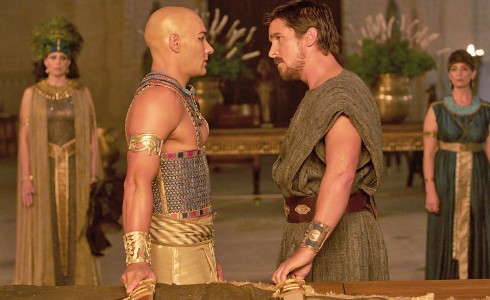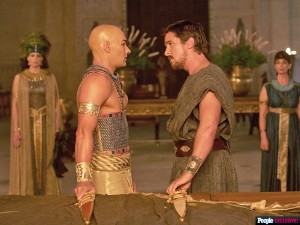Movie a Day Blog doesn’t exactly feel sorry for Ridley Scott. After all, he’s a millionaire several times over and is still actively making big movies at the age of 77, a claim few of his contemporaries can make.
His problem is that he wants to direct big, sweeping epics that touch on the major issues of life and human civilization, but ends up delivering spectacle and little else.
The latest example of Scott’s beautiful hokum is EXODUS: GODS AND KINGS (2014, Theatrical), which takes on one of the Bible’s best-known stories and has as a precedent one of the epic films of the 1950s, Cecil B. DeMille’s THE TEN COMMANDMENTS (1956). It was the first film I consciously remember seeing in a movie theater, one of the film palaces that still remained in downtown Cleveland, where it was a roadshow release, meaning higher priced tickets and reserved seats. It was the first and only movie my grandparents, immigrants from Eastern Europe, ever saw in a theater.
Wisely, Scott pretends the DeMille movie never happened, and spins his tale in a different direction, one that focuses on the shifting relationship between Moses (Christian Bale) and the Pharaoh Ramses (Joel Edgerton); they are raised almost as brothers by the completely miscast John Turturro (arriving in Egypt via Brooklyn, who mercifully dies early on and sets the sibling rivalry in motion.
True to Scott’s intense visual aesthetic, there’s plenty of spectacle (just about anything in the Bible can now be literalized through the magic of computer generated imager)y. The scale of this rendition of ancient Egypt is grand and expansive, the philosophy seeming to be the bigger the monument or statue, the greater the Pharaoh. It is kind of like contemporary Las Vegas, only instead of hotels it’s Pharoahs trying to top their predecessor with the size of their self-glorifications.
Unfortunately, the story does not live up to its setting. By focusing solely on the split between slaver and savior, Scott manages to make a 2 1/2 hour movie that does not explore a single other character than the two leads. That’s a long film to carry on the backs of two men whose personalities never really alter, so the story stays as flat as matzoh without any outstanding personalities to emerge. Sigourney Weaver looks trapped in the palace with nothing to say, and a role that’s never made clear.
Moses has a wife and child, but they’re given about 15 minutes of screen time, then abandoned until the finale. Aaron, Moses’ brother and his magical staff? Excised. Moses the stutterer? Not in Christian Bale’s wheelhouse, but the old Batman growl from THE DARK KNIGHT (2008) does return, which is better than his accent shifting from British to mid-Atlantic, to I swear to God, Israeli. Scott must have wondered how else to set the Jews off from the Egyptians? Make them sound like contemporary Jews, which means Israeli.
In one bold move that almost pays off, Scott decides to reject the booming John Huston-style voice of God emanating from above, and instead presents Yahweh of the Old Testament as a 9-year-old British boy (whom I could not find credited) , a much aggrieved and accusatory God. It’s an inspired choice, and it works until Scott brings him back too many times for essentially the same conversation: God says ‘Why are you fucking up so much and doing such a bad job of what I’m telling you to do?’ while Moses responds, ‘I didn’t ask for this job and I’m doing the best I can.’ Had Scott adhered to the rule of three, and limited the Kid’s exposure to just a few appearances, it would have worked. But familiarity by the fifth or sixth conversation makes him more of a petulant child and less of a God.
As opposed to Darren Aranofsky in NOAH (2014), Scott makes the religious aspect of EXODUS important but not dominant. Moses has no kinship to the religious fundamentalist that Russell Crowe played in NOAH — he’s a military man, a realist and a weary participant in the liberation of his people. As opposed to Charlton Heston, he feels like no prophet and not even a very successful leader. One could almost think watching EXODUS that the Kid could have done better.
There are some great effect sequences; I found the plagues compelling and overwhelming, as they should be. I don’t remember the crocodiles and sharks from the Bible, but the boils, the frogs, the locusts and the final and deadliest killing of the Egyptian first-born are rendered powerfully. It was nice to see superior special effects that did not rely on explosions for impact.
And the penultimate effects sequence, the parting of the Red Sea, is magnificent, looking topographically accurate and a hell of a lot better than the cruder version in TEN COMMANDMENTS. It also builds to a more dramatic climax with CGI waves refilling the sea at an alarming rate, and giving Ramses his final comeuppance.
Finally, that’s all Scott has to offer: big effects, big frames filled with big images of near-destruction, but no real characters other than Ramses and Moses populating them. Scott has faced the same criticism for all of his recent films, and to some detractors, goes back even to his acclaimed movies such as ALIEN (1979) and BLADE RUNNER (1982). These films were better because of the material by Dan O’Bannon and Ronald Shusett in the first film, and Hampton Fancher and David Peoples in the second.
Scott and his late brother Tony have never given up on what excited them about making commercials, which is how they both began their careers. It’s all about the look, the presentation of the image, and less about what’s behind it. EXODUS fails on the same count; it’s just a glorified 180-minute commercial for the Old Testament. The problem is, most of us already have a Bible.



Comments are closed